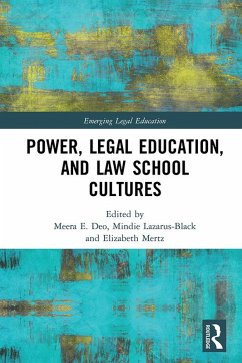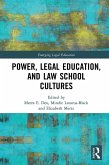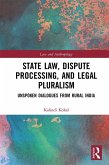Power, Legal Education, and Law School Cultures (eBook, PDF)
Redaktion: Deo, Meera; Mertz, Elizabeth; Lazarus-Black, Mindie
41,95 €
41,95 €
inkl. MwSt.
Sofort per Download lieferbar

21 °P sammeln
41,95 €
Als Download kaufen

41,95 €
inkl. MwSt.
Sofort per Download lieferbar

21 °P sammeln
Jetzt verschenken
Alle Infos zum eBook verschenken
41,95 €
inkl. MwSt.
Sofort per Download lieferbar
Alle Infos zum eBook verschenken

21 °P sammeln
Power, Legal Education, and Law School Cultures (eBook, PDF)
Redaktion: Deo, Meera; Mertz, Elizabeth; Lazarus-Black, Mindie
- Format: PDF
- Merkliste
- Auf die Merkliste
- Bewerten Bewerten
- Teilen
- Produkt teilen
- Produkterinnerung
- Produkterinnerung

Bitte loggen Sie sich zunächst in Ihr Kundenkonto ein oder registrieren Sie sich bei
bücher.de, um das eBook-Abo tolino select nutzen zu können.
Hier können Sie sich einloggen
Hier können Sie sich einloggen
Sie sind bereits eingeloggt. Klicken Sie auf 2. tolino select Abo, um fortzufahren.

Bitte loggen Sie sich zunächst in Ihr Kundenkonto ein oder registrieren Sie sich bei bücher.de, um das eBook-Abo tolino select nutzen zu können.
There is a myth that law students are admitted and then succeed based on raw merit, and that law schools are neutral settings in which professors use their expertise to train those students to become lawyers. Based on original, empirical research, this book investigates this myth from myriad perspectives.
- Geräte: PC
- mit Kopierschutz
- eBook Hilfe
Andere Kunden interessierten sich auch für
![Power, Legal Education, and Law School Cultures (eBook, ePUB) Power, Legal Education, and Law School Cultures (eBook, ePUB)]() Power, Legal Education, and Law School Cultures (eBook, ePUB)41,95 €
Power, Legal Education, and Law School Cultures (eBook, ePUB)41,95 €![Decolonisation, Anti-Racism, and Legal Pedagogy (eBook, PDF) Decolonisation, Anti-Racism, and Legal Pedagogy (eBook, PDF)]() Decolonisation, Anti-Racism, and Legal Pedagogy (eBook, PDF)39,95 €
Decolonisation, Anti-Racism, and Legal Pedagogy (eBook, PDF)39,95 €![Key Directions in Legal Education (eBook, PDF) Key Directions in Legal Education (eBook, PDF)]() Key Directions in Legal Education (eBook, PDF)40,95 €
Key Directions in Legal Education (eBook, PDF)40,95 €![Decolonisation, Anti-Racism, and Legal Pedagogy (eBook, ePUB) Decolonisation, Anti-Racism, and Legal Pedagogy (eBook, ePUB)]() Decolonisation, Anti-Racism, and Legal Pedagogy (eBook, ePUB)39,95 €
Decolonisation, Anti-Racism, and Legal Pedagogy (eBook, ePUB)39,95 €![Global Clinical Legal Education (eBook, PDF) Global Clinical Legal Education (eBook, PDF)]() Global Clinical Legal Education (eBook, PDF)41,95 €
Global Clinical Legal Education (eBook, PDF)41,95 €![State Law, Dispute Processing And Legal Pluralism (eBook, PDF) State Law, Dispute Processing And Legal Pluralism (eBook, PDF)]() Kalindi KokalState Law, Dispute Processing And Legal Pluralism (eBook, PDF)41,95 €
Kalindi KokalState Law, Dispute Processing And Legal Pluralism (eBook, PDF)41,95 €![AI and Legal Education (eBook, PDF) AI and Legal Education (eBook, PDF)]() Anil BalanAI and Legal Education (eBook, PDF)20,95 €
Anil BalanAI and Legal Education (eBook, PDF)20,95 €-
-
-
There is a myth that law students are admitted and then succeed based on raw merit, and that law schools are neutral settings in which professors use their expertise to train those students to become lawyers. Based on original, empirical research, this book investigates this myth from myriad perspectives.
Dieser Download kann aus rechtlichen Gründen nur mit Rechnungsadresse in A, B, BG, CY, CZ, D, DK, EW, E, FIN, F, GR, HR, H, IRL, I, LT, L, LR, M, NL, PL, P, R, S, SLO, SK ausgeliefert werden.
Produktdetails
- Produktdetails
- Verlag: Taylor & Francis eBooks
- Seitenzahl: 316
- Erscheinungstermin: 10. Oktober 2019
- Englisch
- ISBN-13: 9780429520440
- Artikelnr.: 57902026
- Verlag: Taylor & Francis eBooks
- Seitenzahl: 316
- Erscheinungstermin: 10. Oktober 2019
- Englisch
- ISBN-13: 9780429520440
- Artikelnr.: 57902026
- Herstellerkennzeichnung Die Herstellerinformationen sind derzeit nicht verfügbar.
Meera E Deo, JD, PhD, is Director of the Law School Survey of Student Engagement (LSSSE) and Professor of Law at Thomas Jefferson School of Law. Her research merges jurisprudence with empirical methods to interrogate institutional diversity, affirmative action, and racial representation. Her book, Unequal Profession: Race and Gender in Legal Academia (Stanford University Press, 2019) examines how raceX gender affect workplace interactions, tenure, work/life balance, and more. Professor Deo has been a member of the California Commission on Access to Justice, consultant to the ACLU of Southern California, and Chair of the AALS Law and the Social Sciences Section. Mindie Lazarus-Black is Professor Emerita of Anthropology, Temple University. She has conducted fieldwork in Antigua, Trinidad, and the U.S. to understand how, when, and why law operates as a discourse and practice of rights and repression. She is the author of Everyday Harm: Domestic Violence, Court Rites, and Cultures of Reconciliation (2007), Legitimate Acts and Illegal Encounters: Law and Society in Antigua and Barbuda (1994), and co-editor (with Susan F. Hirsch) of Contested States: Law, Hegemony, and Resistance (1994). She has also published in, among others, American Ethnologist, Caribbean Studies, Law & Social Inquiry, and Indiana Journal of Global Legal Studies. Elizabeth Mertz is an anthropologist and law professor; her research focuses on legal language and law school education. Her book, The Language of Law School: Learning to "Think Like a Lawyer," won the Law & Society Association's Herbert Jacob Book Prize ; it also provided empirical support for the 2007 Carnegie Report on legal education. She is a Fellow of the American Anthropological Association; Research Professor at the American Bar Foundation; and John and Rylla Bosshard Professor Emerita at the University of Wisconsin Law School. Her current research focuses on U.S. law professors and the "new legal realism" project.
SECTION I: Legal Pedagogies in Context(s); 1. Theory and Practice, Together
at Last: A Heretical, Empirical Account of Canadian Legal Education; 2.
Teaching International Lawyers How to Think, Speak, and Act like U.S.
Lawyers: Notes on Inchoate Power and the Imperial Process; 3. In the Law
School Classroom: Hidden Messages in French Elite Training; SECTION II:
Class and Market in Legal Education; 4. Legal Training as Socialization to
State Power: An Ethnography of Law Classes for French Senior Civil
Servants; 5. The Perennial (and Stubborn) Challenges of Affordability,
Cost, and Access in Legal Education; 6. Market Creep: "Product" Talk in
Legal Education; SECTION III: Invisible Processes and Images in Legal
Training; 7. Language, Culture, and the Culture of Language: International
JD Students in the U.S. Law Schools; 8. How the Law School Admission
Process Marginalizes Black Aspiring Lawyers; 9. The Culture of
"raceXgender" Bias in Legal Academia; 10. Canaries in the Mines of the U.S.
Legal Academy
at Last: A Heretical, Empirical Account of Canadian Legal Education; 2.
Teaching International Lawyers How to Think, Speak, and Act like U.S.
Lawyers: Notes on Inchoate Power and the Imperial Process; 3. In the Law
School Classroom: Hidden Messages in French Elite Training; SECTION II:
Class and Market in Legal Education; 4. Legal Training as Socialization to
State Power: An Ethnography of Law Classes for French Senior Civil
Servants; 5. The Perennial (and Stubborn) Challenges of Affordability,
Cost, and Access in Legal Education; 6. Market Creep: "Product" Talk in
Legal Education; SECTION III: Invisible Processes and Images in Legal
Training; 7. Language, Culture, and the Culture of Language: International
JD Students in the U.S. Law Schools; 8. How the Law School Admission
Process Marginalizes Black Aspiring Lawyers; 9. The Culture of
"raceXgender" Bias in Legal Academia; 10. Canaries in the Mines of the U.S.
Legal Academy
SECTION I: Legal Pedagogies in Context(s); 1. Theory and Practice, Together
at Last: A Heretical, Empirical Account of Canadian Legal Education; 2.
Teaching International Lawyers How to Think, Speak, and Act like U.S.
Lawyers: Notes on Inchoate Power and the Imperial Process; 3. In the Law
School Classroom: Hidden Messages in French Elite Training; SECTION II:
Class and Market in Legal Education; 4. Legal Training as Socialization to
State Power: An Ethnography of Law Classes for French Senior Civil
Servants; 5. The Perennial (and Stubborn) Challenges of Affordability,
Cost, and Access in Legal Education; 6. Market Creep: "Product" Talk in
Legal Education; SECTION III: Invisible Processes and Images in Legal
Training; 7. Language, Culture, and the Culture of Language: International
JD Students in the U.S. Law Schools; 8. How the Law School Admission
Process Marginalizes Black Aspiring Lawyers; 9. The Culture of
"raceXgender" Bias in Legal Academia; 10. Canaries in the Mines of the U.S.
Legal Academy
at Last: A Heretical, Empirical Account of Canadian Legal Education; 2.
Teaching International Lawyers How to Think, Speak, and Act like U.S.
Lawyers: Notes on Inchoate Power and the Imperial Process; 3. In the Law
School Classroom: Hidden Messages in French Elite Training; SECTION II:
Class and Market in Legal Education; 4. Legal Training as Socialization to
State Power: An Ethnography of Law Classes for French Senior Civil
Servants; 5. The Perennial (and Stubborn) Challenges of Affordability,
Cost, and Access in Legal Education; 6. Market Creep: "Product" Talk in
Legal Education; SECTION III: Invisible Processes and Images in Legal
Training; 7. Language, Culture, and the Culture of Language: International
JD Students in the U.S. Law Schools; 8. How the Law School Admission
Process Marginalizes Black Aspiring Lawyers; 9. The Culture of
"raceXgender" Bias in Legal Academia; 10. Canaries in the Mines of the U.S.
Legal Academy







